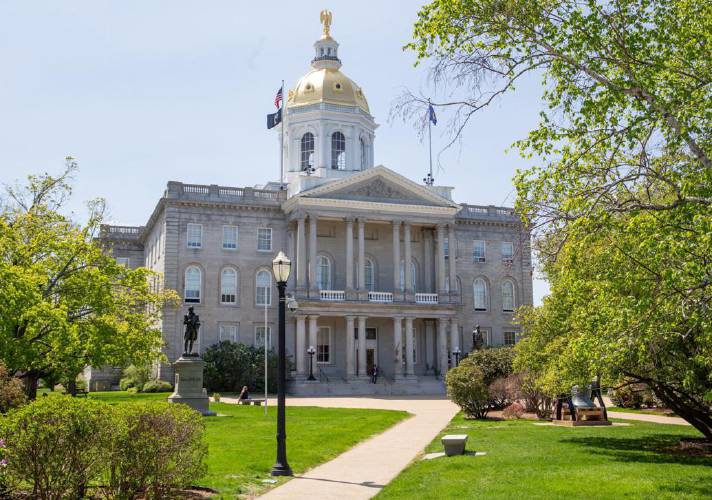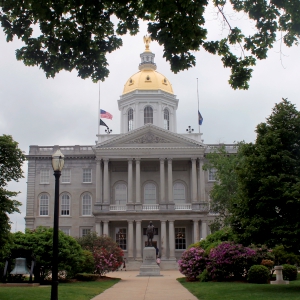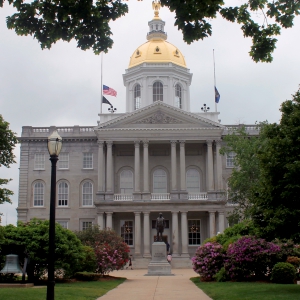Battle over school funding bills at the State House

Concord NH State House
| Published: 01-17-2024 3:59 PM |
While the House Education Committee spent two days last week wrestling with a handful of bills to address the funding of public schools, nearly everyone told lawmakers that schools are struggling to provide students the education opportunity and experience to which the Constitution entitles them. Meanwhile, property taxpayers are increasingly hard pressed to make ends meet.
Donna Magoon, Superintendent of Schools in Newport, asked the committee to picture a teacher welcoming pupils to school who had a parent in jail, been molested, lived with grandparents or had not eaten for days. “Welcome to Newport,” she said, adding that she refers 10 to 15 cases a week to the Division of Children, Youth and Families. She said 28 of 81 teachers in the district are not fully qualified, and as many 25 positions may turn over in a year. She said she has been asked to cut her budget by more than a third to ease the burden on local taxpayers.
Sean Parr of the Manchester School Board said the district, by far the state’s largest with 12,300 students and 21 schools, spends $15,000 per pupil, while the state average per pupil expenditure exceeds $20,000. “We would need to spend another $50 million a year to reach the state average,” he said.
More than half the students qualify for free and reduced-price lunch, a quarter qualify for special education services and a fifth are learning English as a second language.
Sydney Leggett, Superintendent in the Plainfield-Cornish District, explained that, with the rise in property values, an increase in the school budgets leads to a disproportionate increase in tax burdens.
The 4.8% proposed increase in the Cornish school budget translates to an 8.9% increase in the tax burden, while in Plainfield, a 1.75% increase in the school budget would increase the tax burden by 11.7%.
Thomas Oppel, who chairs the Canaan Economic Development Committee, said that “property taxpayers, who are already struggling, are beginning to resent the money they spend on public education,” and cautioned, “that’s a dangerous path to go down to start having people resent public education.”
David Trumble of Weare told the committee the state’s share of the cost of public education is “grossly inadequate” and reminded lawmakers, “This is your obligation, and it has been your obligation for nearly four decades.” He urged the committee to “stop looking at education as an expense and start looking at it as an investment.”
Article continues after...
Yesterday's Most Read Articles
 Neighboring landowner objection stalls Steeplegate redevelopment approval
Neighboring landowner objection stalls Steeplegate redevelopment approval
 How has Hopkinton, one of the smallest public schools in New Hampshire, become such a lacrosse powerhouse?
How has Hopkinton, one of the smallest public schools in New Hampshire, become such a lacrosse powerhouse?
 For some older Jewish professors at Dartmouth and UNH, opposition to campus arrests feels personal
For some older Jewish professors at Dartmouth and UNH, opposition to campus arrests feels personal
 Northeast Coffee Festival comes to Concord this weekend
Northeast Coffee Festival comes to Concord this weekend
 Driven by capital projects, city budget proposal would boost spending by $40 million
Driven by capital projects, city budget proposal would boost spending by $40 million
 Henniker Handmade & Homegrown
Henniker Handmade & Homegrown
Lawmakers are working in the shadow of the two decisions by Judge David Ruoff of Rockingham County Superior Court in November. In the suit, brought by the ConVal School District, Ruoff found the state share of school funding, based on a per-pupil cost of $4,100, “constitutionally insufficient” and set $7,360 as a bare minimum.
At the same time, in the suit filed by Steven Rand and six property taxpayers, Ruoff also held the administration of Statewide Education Property Tax (SWEPT) unconstitutional. By allowing property-rich municipalities — known as “donor towns” — to retain revenue in excess of their adequate education costs, taxpayers are spared the full rate of the tax and funding for schools in other municipalities is reduced.
While Republicans sat on the sidelines, House Democrats reintroduced a bill to overhaul the system for funding public schools that the Legislature shelved in 2022.
HB 1586 mirrors the report of the Commission to Study School Funding of 2020. Rep. David Luneau (D-Hopkinton), who chaired the commission, is its prime sponsor, and attorney Bill Ardinger, Governor Sununu’s nominee to the commission, is among its principal architects and impassioned advocates. Rep. Rick Ladd (R-Haverhill), who chairs the House Education Committee, was the lone Republican lawmaker on the commission and voted against accepting its final report.
The bill would overhaul the system of financing public schools, but would not increase the total amount of funding significantly, if at all. Instead, it would allocate a disproportionate share of state dollars to those school districts with the greatest number of disadvantaged students and the least fiscal capacity, measured by equalized property valuation, to serve them. In short, the bill is characterized by revenue neutrality and targeted state aid.
The 26-page bill redefines an adequate education as the opportunity to achieve the average statewide level of student performance measured by assessment scores, graduation rates and attendance records. The funding formula incorporates the needs of the student population measured by the number living in poverty, learning English as a second language and receiving special education services. It also accounts for the cost of educational inputs, particularly teacher salaries, as well as costs arising from other characteristics of the district.
Taken together, these factors would underpin a “foundation opportunity budget” tailored to each school district with sufficient funding to provide its students the opportunity to perform at the average statewide level. The bill ensures accountability by measuring the academic performance of schools and includes a process for assisting those performing below par to reach it.
Ardinger stressed that the current distribution of state funding, which allocates a uniform amount per pupil to every district, “makes no sense.” Instead he insisted that more funding should be directed to those districts with the greatest needs and stiffest challenges. He said New Hampshire public schools all together rank among the very best among the 50 states. But, districts with relatively low property values along with a high numbers of students from low-income households and with special educational needs require additional resources to provide their children with comparable learning opportunities.
The bill would also cure the constitutional flaw in the SWEPT by requiring the state, not the municipalities, to collect the tax, deposit the revenue in the Education Trust Fund and distribute the funds in accord with the formula specified by the bill.
The program would be funded by a minimum local contribution of $5 per $1,000 of assessed property valuation, a statewide property tax set at a rate to raise $363 million, which in 2022 was $1.51 per $1,000 of assessed value, and some $600 million from the education trust fund, a grocery basket of state taxes and fees.
In districts with the highest property values, the minimum local contribution would be more than enough to fund school budgets, while in most districts state dollars would fund the outstanding balance. Property taxes, state and local, would continue to provide the largest share of education funding.
Consequently, the bill would also expand the Low and Moderate Income Homeowners Tax Relief Program by providing up to $25 million a fiscal year to offset a share of burdensome tax bills. Single homeowners with annual income up to $55,000 and married homeowners with income up to $70,000 would be eligible for up to $1,000 a year.
“Although I respect the sponsors of this bill,” began Andru Volinsky, the lead attorney in the Claremont litigation, “their position to me is heartbreaking, because I think the bill violates the New Hampshire Constitution, as it was described and explained in the Claremont and Londonderry decisions.”
He called HB 1586 “a retreat from Claremont.”
Returning to the Claremont decisions, Volinsky reminded the committee the court ordered the Legislature to define an adequate education in a “clear, commonsense, generally understandable fashion” and to “fairly and objectively” cost its components. Above all, the justices ruled “whatever the state identifies as comprising constitutional adequacy it must pay for. None of that financial obligation can be shifted to local school districts regardless of their relative wealth or need.”
Volinsky said, by redefining an adequate education in terms of student performance or outcomes, the bill specifies “scores that must be achieved without identifying the components in those successful schools that make them successful,” and consequently the cost of an adequate education cannot be objectively determined.
“Not to be unfair,” Volinsky said, “but the Legislature doesn’t deserve the benefit of the doubt in costing out adequacy. It needs to be able to show its homework.” The targeted aid model, he said flatly, “was adopted because it cost less than fairly paying for adequacy.”
The bill’s accountability provisions, Volinsky said, fail to provide any additional financial resources to schools that fail to meet the performance standards it prescribes. He reminded the committee of the Every Student Succeeds Act (ESSA), enacted by Congress in 2015, which provides extra federal funding to struggling schools.
Currently, schools in Manchester, Nashua, Franklin, Claremont, Rochester and Somersworth are receiving extra federal assistance.
While advocates of school funding reform are at odds, Republican lawmakers are bent on scorching it. The only bill filed by a Republican, HB 1675, sponsored by Rep. Alicia Lekas (R-Hudson) would punish underperforming schools. Her bill would reduce state funding per pupil by 25% each year from FY 2026 to FY 2028 and thereafter to 50% for each pupil testing below proficiency in mathematics and language arts, exempting only those pupils eligible for special education services.
“I tried the carrot,” Lekas told the committee, “and now I’m trying what you might call the stick.”
With a narrowly divided House and a Republican-controlled Senate, both distracted by the politics of a contentious election, there is no prospect of meaningful school funding legislation this year.
Before the Legislature convened, Senator Jeb Bradley (R-Wolfeboro), the president of the Senate, dismissed Ruoff’s decisions as “overreach” and vowed the Senate will reject legislation to comply with them. “There is no way, in my opinion, to do that without an income tax or a sales tax, or possibly both,” he said. “That totally undermines the New Hampshire Advantage, and we just can’t go that route.”
Speaking for the Republican caucus, Bradley declared, “Between the 14 of us, an income tax, a sales tax and donor towns are off the table. We have met our responsibility to help towns, help schools, help counties, lower property taxes, and we’ll continue to do that.” He added that the Republican caucus would await the outcome of the ongoing litigation.
The first lawsuit challenging the state’s scheme of funding public schools was filed in 1982 on behalf of the town of Lisbon, where classes were held in a renovated chicken coop. Since then, four decades of litigation and legislation have passed, and with the ConVal case on appeal and the Rand case underway, another decade of stalemate appears in the offing.
These articles are being shared by partners in The Granite State News Collaborative. For more information visit collaborativenh.org.


 Transgender sports ban receives Senate committee support
Transgender sports ban receives Senate committee support House passes bill to raise minimum marriage age to 18, sending it to governor
House passes bill to raise minimum marriage age to 18, sending it to governor Charities will not have to pay rent to casinos under new law
Charities will not have to pay rent to casinos under new law Sununu says he’ll support Trump even if he’s convicted
Sununu says he’ll support Trump even if he’s convicted
